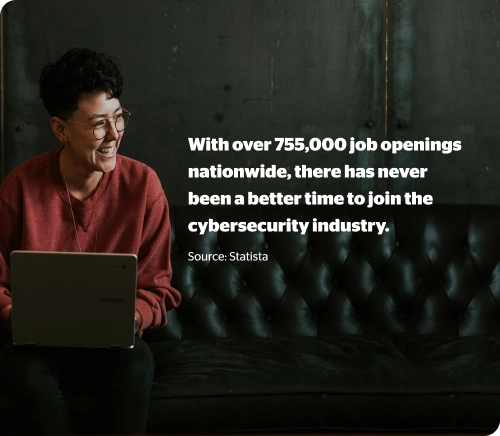University of Miami Cybersecurity Professional Bootcamp
Accelerated Program | Career Prep | In-Depth Training


Become a Professional in Less Than a Year
Set the Stage for a Successful Cybersecurity Career
The University of Miami Cybersecurity Professional Bootcamp equips you with the skills to transition into the cybersecurity industry in just 36 weeks. This program is designed to take you from beginner to job-ready, with hands-on training led by expert instructors and immersive simulations of real-world cyberattacks. Our curriculum also integrates the latest AI advancements within cybersecurity topics to ensure you are prepared for the future.
Build the Cybersecurity Skills Employers Want
Gain hands-on experience with top industry tools and software while developing the advanced skills that will help you stand out to employers.

Equipping You With the Tools To Succeed
Hands-On Classes
Engage in practical exercises and simulations to develop the job-ready skills needed to succeed in the cybersecurity field.
Virtual Classroom
Study remotely with part-time, weekday classes, and collaborate with instructors and peers through our interactive virtual tools.
Expert Instructors
Our instructors are seasoned cybersecurity professionals actively working in the field. They bring real-world expertise to your learning experience, offering you unique insights into the latest tools and techniques.
TDX Arena
Enhance your cybersecurity skills with TDX Arena, our exclusive virtual training platform. Engage in immersive, gamified learning by experiencing real-world cyberattacks, applying what you have learned in class, and testing your expanding knowledge and abilities.
Personalized Support Every Step of the Way
Professional Network
Attend live virtual events with career fairs, industry panels, mock interview days, skill-building webinars, and more.
Career Coaching
This program includes a team of career advisors and coaches dedicated to getting you on the right track to the career of your dreams. They empower you to be a top candidate for job opportunities by helping with your resume, LinkedIn profile, interview prep, and more.
Student Support
Student Success Managers are here to make sure you thrive during this program and beyond. From helping learners access additional resources and tutoring sessions to keeping you accountable and arranging test retakes, they ensure you always get the support you need.
Job Search Assistance
Get a team of career services professionals whose mission is to help you find the best job opportunities for the career you want. They are instrumental in getting your foot in the door with future employers and jumpstarting your professional path in cybersecurity.

Discover Everything You Will Learn
Explore the Course Catalog
Program Overview
32-Week Cybersecurity Bootcamp
- Fundamentals Phase12 Weeks
The 12-week Fundamentals Phase covers essential cybersecurity principles, including network basics and their functions, Microsoft’s infrastructure, and Linux operating system management. You will leave this phase with a solid foundation to help you advance in the world of cybersecurity.
- Computer Networking Fundamentals
In this course, you will master the essentials of computer networking. You’ll explore how different devices connect and communicate securely across networks. Hands-on activities will help you apply this knowledge in real-world scenarios to optimize network performance.
Course Highlights:
- Focuses on practical, hands-on learning in network security and performance.
- Provides a strong foundation in configuring and managing network architectures.
- Equips you with the knowledge to handle real-world networking challenges.
The knowledge gained in this course will help you begin preparing for certifications such as CompTIA® Network+ and ISC2 Certified in Cybersecurity.*
- Microsoft Security Systems Administration
In this course, you will learn the key strategies for securing Microsoft Windows environments using tools such as Microsoft Defender and BitLocker. You will also focus on system administration tasks, ensuring secure and stable network management.
- Develop skills to manage Linux systems and secure cloud infrastructures.
- Learn the basics of Python programming for cybersecurity use.
- Create AWS cloud instances and understand cloud infrastructure.
- Monitor, scan, and remediate threats and vulnerabilities in systems.
- Explore DevSecOps and its role in modern cybersecurity practices.
Information covered in this course helps prepare you to begin studying for the following certification:* AWS Cloud Practitioner
- Integrating Your Infrastructure Security
In this course, you will focus on securing Linux systems and cloud environments while learning basic Python programming. You will gain practical skills in threat monitoring, vulnerability analysis, and remediation techniques, with a focus on DevSecOps.
Learners will:
- Acquire knowledge of managing Linux operating systems and effectively monitoring, scanning, and analyzing threats and vulnerabilities in Linux and cloud-based environments.
- Receive an introduction to Python programming.
- Develop a fundamental understanding of cloud computing environments, including creating an instance using Amazon Web Services (AWS).
- Learn how to remediate and share details to safeguard other systems.
- Learn how to create automations to efficiently manage and protect systems.
- Explore the design principles of scalable cloud solutions and the integration of diverse environments.
- Familiarize themselves with DevSecOps.
The information covered in this course serves as a foundation for learners preparing to study for the AWS Cloud Practitioner certification.*
- Infrastructure Phase12 Weeks
The Infrastructure Phase provides you with the knowledge and hands-on experience to create and sustain secure infrastructures and technologies. You will gain practical skills in applying critical security measures, as well as an understanding of a hacker’s perspective, to safeguard organizational systems.
- Securing Your Network
This course covers the security aspects of wired and wireless networks, with a focus on access controls, network monitoring, and building secure network environments. You will learn how to safeguard data, people, and devices from vulnerabilities.
Course Highlights:
- Master network security strategies for wired and wireless systems.
- Develop monitoring and management skills for network security.
- Learn to create and manage access controls to protect network resources.
- Understand the importance of encryption in maintaining network security.
- Build secure network architectures to protect against vulnerabilities.
Information covered in this course helps prepare you to begin studying for the following certifications:* CompTIA® Network+, Cisco Certified CyberOps Associate
- Designing Your Cybersecurity Infrastructure
In this course, you will focus on the essentials of securing endpoint devices, implementing data loss prevention strategies, and protecting IoT and industrial systems. You will also gain experience with advanced cybersecurity tools to safeguard digital infrastructures.
Course Highlights:
- Secure endpoint devices and protect them from potential threats.
- Implement strategies to prevent data loss and protect sensitive data.
- Learn the specific security needs of IoT devices and industrial systems.
- Develop skills in documenting and tracking configuration settings.
- Get hands-on experience with advanced cybersecurity tools and practices.
Information covered in this course helps prepare you to begin studying for the following certifications:* CompTIA® Security+, CompTIA® CySA+, ISC2 CISSP
- Social Engineering and Ethical Hacking
In this course, you will learn to anticipate and counter the tactics used by malicious actors through ethical hacking and social engineering. You will explore how attackers use psychological manipulation and how ethical hackers can help protect systems.
Course Highlights:
- Gain insights into hacker motivations and tactics.
- Learn ethical hacking practices to uncover and fix system vulnerabilities.
- Understand social engineering techniques and how to guard against them.
- Master penetration testing and security defense strategies.
- Develop skills in vulnerability reporting and risk management.
Information covered in this course helps prepare you to begin studying for the following certifications:* CompTIA® CySA+, PenTest+
- Advanced Phase8 Weeks
The 8-week Advanced Phase focuses on the knowledge to respond to attacks and secure systems against future threats using digital forensics and post-attack response tools.
Upon successful completion of this phase, you will receive your Cybersecurity Professional Bootcamp certificate of completion.
- Digital Forensics and Incident Response
Explore how to respond to cyberattacks in this course on digital forensics and incident response. You will learn to investigate incidents, recover lost data, and compile reports that help improve security measures for the future.
Course Highlights:
- Learn to investigate cyberattacks using digital forensic techniques.
- Gain skills in collecting and analyzing digital evidence.
- Recover data compromised during a security breach.
- Develop strategies for responding to cybersecurity incidents.
- Prepare detailed forensic reports to document your findings.
Information covered in this course helps prepare you to begin studying for the following certifications:* CompTIA® Security+, CompTIA® CySA+, and ISC2 SSCP
- Threat Hunting and Intelligence
In this course, you will focus on detecting vulnerabilities and identifying cyber threats before they compromise an organization’s infrastructure. Learn how to gather and analyze threat intelligence and respond proactively to secure digital environments.
Course Highlights:
- Learn to identify infrastructure vulnerabilities and detect cyber threats.
- Master threat hunting techniques for real-time threat response.
- Develop strategies for gathering and utilizing threat intelligence.
- Build effective security plans to safeguard systems from attacks.
- Gain hands-on skills in securing network, hardware, and software infrastructures.
Information covered in this course helps prepare you to begin studying for the following certifications:* CompTIA® Security+, CompTIA® CySA+, ISC2 SSCP, ISC2 CISSP
*For more information, please visit https://thrivedx.com/cybersecurity-program-disclaimers.
Gain the Skills You Need To Study for Industry Certifications
If you are new to the cybersecurity industry, obtaining industry-recognized certifications* can help boost your credentials and give you a competitive advantage over other candidates. Our courses cover concepts to help you gain foundational knowledge of the following certifications you may wish to pursue after completing the Cybersecurity Professional Bootcamp.
AWS Certified Cloud Practitioner
The AWS Certified Cloud Practitioner certification exam is designed for individuals familiar with the extensive AWS Cloud platform, including its infrastructure and systems. To pass the exam, you will need experience in AWS Cloud security and compliance.
The Cybersecurity Professional Bootcamp offers complimentary access to the AWS Academy curriculum and a discounted voucher for the AWS Certification exam.* Through the program materials, you will gain practical knowledge of AWS Cloud practices, helping you prepare for AWS Cloud Certification and pursue entry-level roles in the field.
*For more information, please visit https://thrivedx.com/cybersecurity-program-disclaimers.
Certified Information Security Manager
Data breaches, ransomware attacks and other constantly evolving security threats are top-of-mind for today’s IT professionals. With a Certified Information Security Manager® (CISM®) certification, you will learn how to assess risks, implement effective governance and proactively respond to incidents.
CertNexus® CyberSec First Responder® (CFR)
The Cybersecurity Professional Bootcamp helps you prepare for the CertNexus® CyberSec First Responder® (CFR) certifications. A 20% discount for CertNexus® certifications and prep material is available to you upon completion of the bootcamp.*
*For more information, please visit https://thrivedx.com/cybersecurity-program-disclaimers.
Cisco Certified CyberOps Associate
The Cisco Certified CyberOps Associate certification allows you to gain an understanding of how Security Operations Centre (SOC) teams detect and respond to security incidents and is considered a great starting point for cybersecurity professionals.
CompTIA® CySA+
This exam is designed to focus more on applying behavioral analytics to networks at an intermediate level than the CompTIA® Security+ exam. It will test your core cybersecurity skills, with an emphasis on software and application security. Additionally, it will cover automation, threat hunting, and IT compliance within the industry.
CompTIA® Network+
The CompTIA® Network+ certification exam requires you to know how to configure, manage, and troubleshoot a variety of network devices. The exam also expects cyber professionals to be familiar with emerging technologies such as mobile, cloud, communication, and virtualization technologies.
CompTIA® Security+
The CompTIA® Security+ certification is a globally recognized credential that validates foundational skills in cybersecurity, including threat management, risk assessment, and network security. It is ideal for entry-level security professionals and is often a key stepping stone for careers in information security and IT.
GIAC Certified Incident Handler
The GIAC Incident Handler certification validates your ability to detect, respond, and resolve computer security incidents using a wide range of essential security skills. Once you hold the GCIH certification, you will have the knowledge needed to manage security incidents by understanding common attack techniques, vectors, and tools, as well as defend against and respond to such attacks when they occur.
GIAC Security Essentials
The GIAC Security Essentials (GSEC) certification verifies your knowledge of information security beyond basic terms and concepts. As a GSEC certification holder, you demonstrate that you are qualified for hands-on IT roles focused on security tasks.
ISC2 SSCP – Systems Security Certified Practitioner
For students who have gained one year of experience after program completion, the ISC2 SSCP certification is ideal for showcasing your technical and practical hands-on security knowledge. With this certification, you will demonstrate your ability to implement, monitor, and manage IT infrastructure in alignment with information security policies and procedures.*
* In order to be certified, learners must have a minimum of at least one year of cumulative work experience in one or more of the seven disciplines of the SSCP Common Body of Knowledge (CBK)
LPI Linux Essentials
The Linux LPI Essentials exam allows you to validate your knowledge of the Linux operating system and various open-source applications. This exam tests your ability to manage users and groups on Linux, assesses your proficiency with the Linux command line, system permissions, and security, as well as your basic network configuration skills and overall Linux administration.
- AWS Certified Cloud Practitioner
The AWS Certified Cloud Practitioner certification exam is designed for individuals familiar with the extensive AWS Cloud platform, including its infrastructure and systems. To pass the exam, you will need experience in AWS Cloud security and compliance.
The Cybersecurity Professional Bootcamp offers complimentary access to the AWS Academy curriculum and a discounted voucher for the AWS Certification exam.* Through the program materials, you will gain practical knowledge of AWS Cloud practices, helping you prepare for AWS Cloud Certification and pursue entry-level roles in the field.
*For more information, please visit https://thrivedx.com/cybersecurity-program-disclaimers.
- Certified Information Security Manager
Data breaches, ransomware attacks and other constantly evolving security threats are top-of-mind for today’s IT professionals. With a Certified Information Security Manager® (CISM®) certification, you will learn how to assess risks, implement effective governance and proactively respond to incidents.
- CertNexus® CyberSec First Responder® (CFR)
The Cybersecurity Professional Bootcamp helps you prepare for the CertNexus® CyberSec First Responder® (CFR) certifications. A 20% discount for CertNexus® certifications and prep material is available to you upon completion of the bootcamp.*
*For more information, please visit https://thrivedx.com/cybersecurity-program-disclaimers.
- Cisco Certified CyberOps Associate
The Cisco Certified CyberOps Associate certification allows you to gain an understanding of how Security Operations Centre (SOC) teams detect and respond to security incidents and is considered a great starting point for cybersecurity professionals.
- CompTIA® CySA+
This exam is designed to focus more on applying behavioral analytics to networks at an intermediate level than the CompTIA® Security+ exam. It will test your core cybersecurity skills, with an emphasis on software and application security. Additionally, it will cover automation, threat hunting, and IT compliance within the industry.
- CompTIA® Network+
The CompTIA® Network+ certification exam requires you to know how to configure, manage, and troubleshoot a variety of network devices. The exam also expects cyber professionals to be familiar with emerging technologies such as mobile, cloud, communication, and virtualization technologies.
- CompTIA® Security+
The CompTIA® Security+ certification is a globally recognized credential that validates foundational skills in cybersecurity, including threat management, risk assessment, and network security. It’s ideal for entry-level security professionals and is often a key stepping stone for careers in information security and IT.
- Certified Incident Handler
The GIAC Incident Handler certification validates your ability to detect, respond, and resolve computer security incidents using a wide range of essential security skills. Once you hold the GCIH certification, you will have the knowledge needed to manage security incidents by understanding common attack techniques, vectors, and tools, as well as defend against and respond to such attacks when they occur.
- GIAC Security Essentials
The GIAC Security Essentials (GSEC) certification verifies your knowledge of information security beyond basic terms and concepts. As a GSEC certification holder, you demonstrate that you are qualified for hands-on IT roles focused on security tasks.
- ISC2 SSCP – Systems Security Certified Practitioner
For students who have gained one year of experience after program completion, the ISC2 SSCP certification is ideal for showcasing your technical and practical hands-on security knowledge. With this certification, you will demonstrate your ability to implement, monitor, and manage IT infrastructure in alignment with information security policies and procedures.*
* In order to be certified, learners must have a minimum of at least one year of cumulative work experience in one or more of the seven disciplines of the SSCP Common Body of Knowledge (CBK)
- LPI Linux Essentials
The Linux LPI Essentials exam allows you to validate your knowledge of the Linux operating system and various open-source applications. This exam tests your ability to manage users and groups on Linux, assesses your proficiency with the Linux command line, system permissions, and security, as well as your basic network configuration skills and overall Linux administration.

Program Tuition
Now is the time to seize this opportunity to enter a new career in cybersecurity. Invest in your professional development with the knowledge and skills you need to enter the field.
$18,900
- 32-Week Cybersecurity Bootcamp
- *Includes a $180 registration fee
Requirements
- Internet access
Tuition, fees, and deposits are subject to change.








